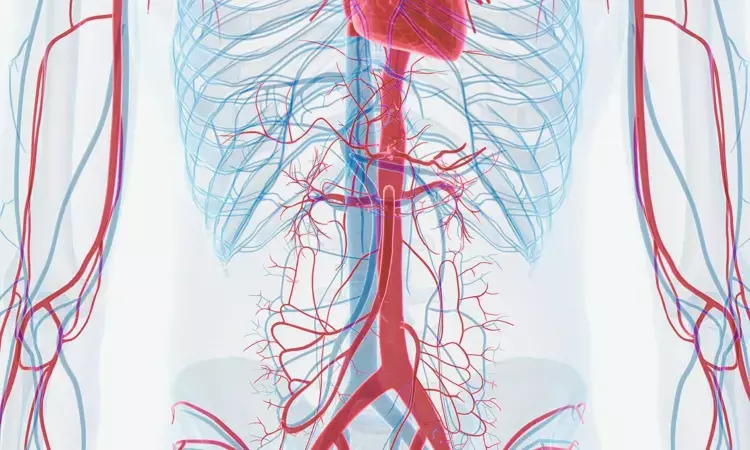- Home
- Medical news & Guidelines
- Anesthesiology
- Cardiology and CTVS
- Critical Care
- Dentistry
- Dermatology
- Diabetes and Endocrinology
- ENT
- Gastroenterology
- Medicine
- Nephrology
- Neurology
- Obstretics-Gynaecology
- Oncology
- Ophthalmology
- Orthopaedics
- Pediatrics-Neonatology
- Psychiatry
- Pulmonology
- Radiology
- Surgery
- Urology
- Laboratory Medicine
- Diet
- Nursing
- Paramedical
- Physiotherapy
- Health news
- Fact Check
- Bone Health Fact Check
- Brain Health Fact Check
- Cancer Related Fact Check
- Child Care Fact Check
- Dental and oral health fact check
- Diabetes and metabolic health fact check
- Diet and Nutrition Fact Check
- Eye and ENT Care Fact Check
- Fitness fact check
- Gut health fact check
- Heart health fact check
- Kidney health fact check
- Medical education fact check
- Men's health fact check
- Respiratory fact check
- Skin and hair care fact check
- Vaccine and Immunization fact check
- Women's health fact check
- AYUSH
- State News
- Andaman and Nicobar Islands
- Andhra Pradesh
- Arunachal Pradesh
- Assam
- Bihar
- Chandigarh
- Chattisgarh
- Dadra and Nagar Haveli
- Daman and Diu
- Delhi
- Goa
- Gujarat
- Haryana
- Himachal Pradesh
- Jammu & Kashmir
- Jharkhand
- Karnataka
- Kerala
- Ladakh
- Lakshadweep
- Madhya Pradesh
- Maharashtra
- Manipur
- Meghalaya
- Mizoram
- Nagaland
- Odisha
- Puducherry
- Punjab
- Rajasthan
- Sikkim
- Tamil Nadu
- Telangana
- Tripura
- Uttar Pradesh
- Uttrakhand
- West Bengal
- Medical Education
- Industry
CCR2 Identified as Promising Biomarker for AAA-Associated Aortic Disease: Study

Researchers have found in a new study that CCR2 shows strong potential as a biomarker for diseased aortic tissue in abdominal aortic aneurysm (AAA), supporting its use in future molecular imaging and targeted therapies.
This study evaluated whether C-C Chemokine Receptor 2 (CCR2) is a tissue biomarker of aortic disease severity, particularly in patients with abdominal aortic aneurysm (AAA).
There is an unmet clinical need for tissue biomarkers that can monitor abdominal aortic aneurysm progression and predict rupture risk. Given the key role of inflammation in abdominal aortic aneurysm pathogenesis, we hypothesized that CCR2, involved in the recruitment and activation of immune cells, is upregulated in abdominal aortic aneurysms. They used our human vascular biobank to obtain aortic tissue from 42 individuals with non-ruptured and ruptured abdominal aortic aneurysm (rAAA), aortoiliac occlusive disease (AOD), or normal abdominal aorta (NAA).
We evaluated aortic wall CCR2-positive cellular content and aortic tissue levels of cytokines and CCR2 ligand, monocyte chemoattractant protein 1 (MCP1). Additionally, a single-cell RNA sequencing dataset was analyzed to assess Ccr2 expression in human abdominal aortic aneurysm tissues. Results: Compared with NAA, the aneurysmal aorta (AAA and rAAA) demonstrated significantly higher CCR2-positive cellular content (P<0.05). The number of aortic wall CCR2-positive macrophages was significantly elevated in individuals with abdominal aortic aneurysm (P<0.05), rAAA (P<0.01), and AOD (P<0.01). They also observed higher levels of MCP1 and inflammatory cytokines in diseased aortic tissue. Furthermore, single-cell transcriptomics revealed that in abdominal aortic aneurysm tissue, Ccr2 is predominantly expressed by macrophages (69%), followed by T-cells (22%), and B-cells (8%).
The findings indicate that CCR2 is a promising biomarker for diseased aortic tissue, particularly in the setting of abdominal aortic aneurysm. These findings suggest potential applications for novel molecular imaging and pharmacological targeting.
Reference:
Hafezi, Shahab MD*; Arif, Batool MS*; Ruhel, Rajrani PhD†; Zaghloul, Mohamed MD*; Elizondo-Benedetto, Santiago MD*; Pyeatte, Sophia R. MD*,‡; Joseph, Karan BS*; Zhang, Bo PhD†; Lin, Chieh-Yu MD PhD§; Gropler, Robert J. MD∥; Zayed, Mohamed A. MD PhD MBA*,‡,∥,¶,#,**. C-C Chemokine Receptor 2 is a Tissue Biomarker for Abdominal Aortic Aneurysmal and Occlusive Disease. Annals of Surgery ():10.1097/SLA.0000000000006778, June 11, 2025. | DOI: 10.1097/SLA.0000000000006778
Dr. Shravani Dali has completed her BDS from Pravara institute of medical sciences, loni. Following which she extensively worked in the healthcare sector for 2+ years. She has been actively involved in writing blogs in field of health and wellness. Currently she is pursuing her Masters of public health-health administration from Tata institute of social sciences. She can be contacted at editorial@medicaldialogues.in.
Dr Kamal Kant Kohli-MBBS, DTCD- a chest specialist with more than 30 years of practice and a flair for writing clinical articles, Dr Kamal Kant Kohli joined Medical Dialogues as a Chief Editor of Medical News. Besides writing articles, as an editor, he proofreads and verifies all the medical content published on Medical Dialogues including those coming from journals, studies,medical conferences,guidelines etc. Email: drkohli@medicaldialogues.in. Contact no. 011-43720751


